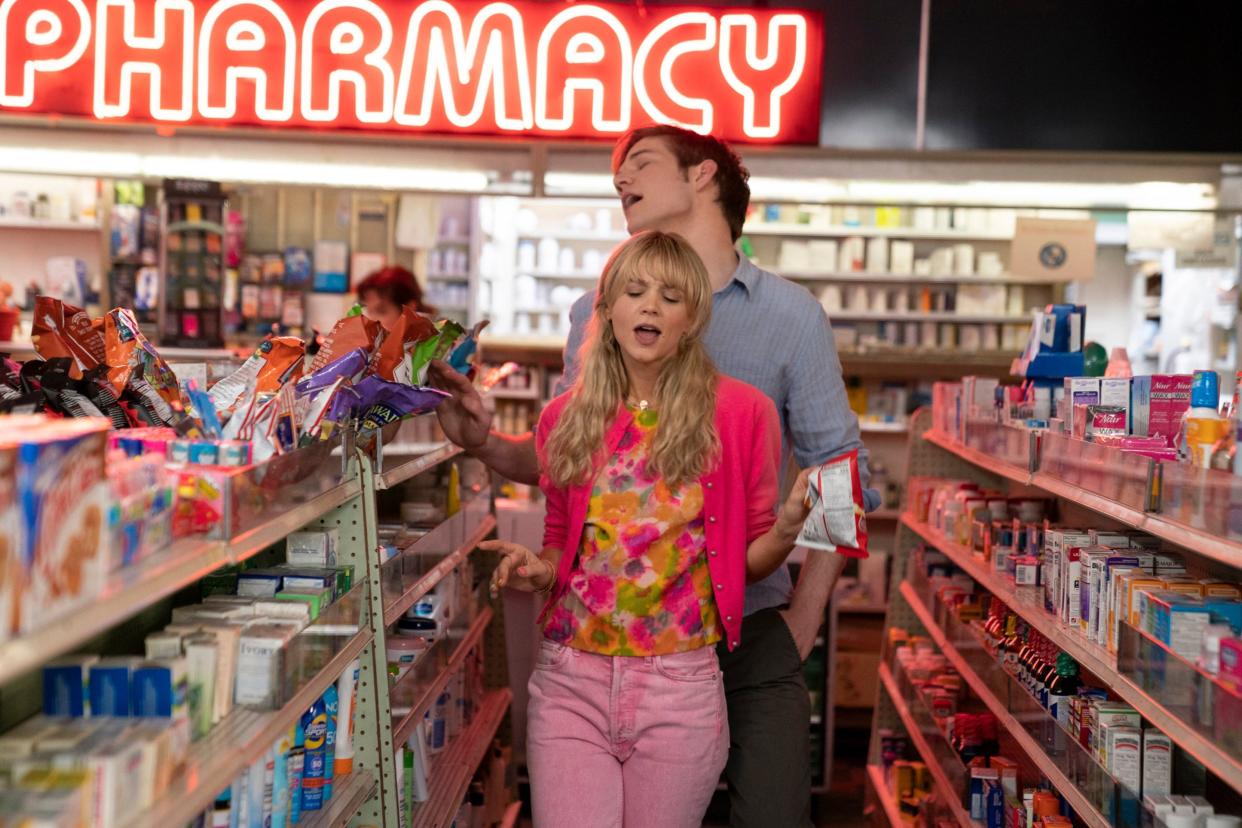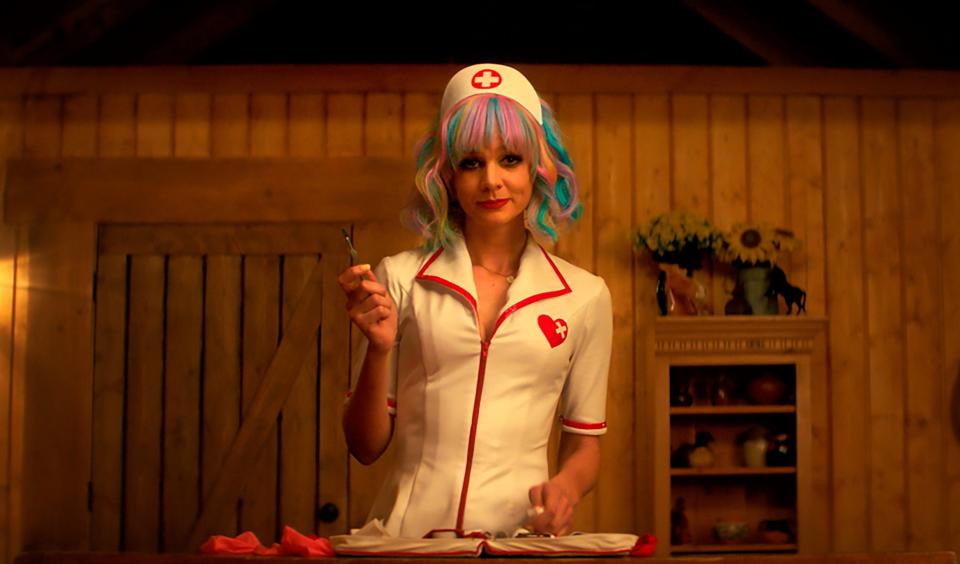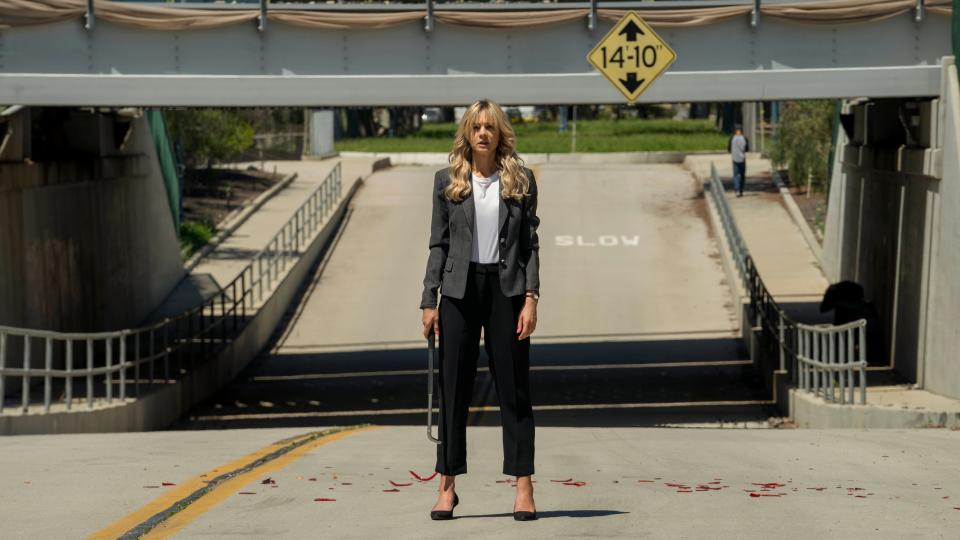Promising Young Woman review: Emerald Fennell’s confident debut is strong medicine with a spoonful of sugar

In 2012, a documentary called The Invisible War blew the whistle on group-sanctioned sexual abuse in the US military, exposing the horrors heaped on women who dare to go public when they’re raped by colleagues. Very few people saw it because, d’uh, it was depressing. Emerald Fennell’s BAFTA-winning, Oscar-nominated thriller is just as keen to open our eyes, but uses sugary colours and humour to make the medicine go down.
The wonderful Carey Mulligan (stretched as never before) is 30 year-old American, Cassie Thomas. Cassie is angry and traumatised, but it’s not until the end of the movie that we fully understand why. I don’t want to spoil the twists. All you need to know is that when Cassie and her best friend, Nina, were at med school, Nina was raped at a party by a fellow student, Al Monroe (Chris Lowell). When Nina made an official complaint, her friends, and the female dean of the university (Connie Britton), sided with Al, as did a range of high-end lawyers, led by Mr Green (Alfred Molina). The consensus at the time: because Nina was blind drunk, she was asking for trouble. Instead of making accusations, she should have kept her head down and her mouth shut.
In the last few years, Cassie has been leading a double life. By day, she works in a coffee shop. By night, she tricks self-styled “nice” men into thinking she’s wasted and therefore an easy lay. Just as they’re preparing to tuck into her body without her consent, she rams something else down their throats.

Before watching Promising Young Woman, I assumed Cassie was some kind of serial killer. Fennell was the showrunner for the second series of hit TV show, Killing Eve. With bad girls currently so popular, surely the 35 year old Brit would serve up more gore? But no, Fennell refuses to repeat herself and, though she has a bit of fun with some ketchup, establishes early on that this former medical student abides by the motto ‘primum non nocere’.
Cassie’s life changes when she meets Ryan (Bo Burnham), a witty, self-deprecating pediatrician who, at college, was part of Al’s gang. Ryan still knows Al and is Facebook pals with a so-called friend of Nina’s, Madison (Alison Brie). Ryan restores Cassie’s faith in men. But he also reminds Cassie that Nina’s tormentors are alive and well. Will Cassie do the sane thing and “move on”?
A now infamous Variety review suggested that Mulligan wasn’t quite right as Cassie and that a more obviously glamorous actress, like Margot Robbie (one of the film’s producers), would have been a better fit. As it happens, Cassie is immensely attractive. But the movie goes to great lengths to make clear that you don’t have to be the sexiest woman in the room to attract the attention of scum-bags. There’s literally a scene where a stung guy looks Cassie up and down and snarls, “You’re not even that hot!” Life’s a beauty pageant and men always get to play judge. What makes Cassie so invigorating is that she’s wise to this rigged game. “You’re hardly dropping panties yourself,” she drawls. “When was the last time you scored in daylight?”

Cassie speaks truth to power and her jaundiced one-liners are a hoot. She actively enjoys intimidating people, but the beauty of Fennell’s script is that Cassie is also goofy, vulnerable and odd. She wears tops decorated with fawns and little girls hugging. When friends come to her parents’ house, and roll their eyes at the kitsch décor, she’s as indifferent to their snobbery as a toddler would be. It’s as if Nina’s rape has wizened Cassie but also retarded her development. You can never predict her reactions; she’s a schemer and a dreamer. In other words, she’s like no heroine we’ve ever seen.
Cassie’s wardrobe seems designed to lure in teens, as is the music (by the likes of Cyn, Maya B, Charli XCX and Sky Ferreira) and the emphasis on the far-reaching power of mobile phones. These are all canny moves. Fennell has made her movie accessible to exactly the kind of young women currently spearheading campaigns against rape culture in schools.
Though this is Fennell’s first feature film, every set-piece spills over with confidence. A few lush seconds from Night of the Hunter dovetail gorgeously with Promising Young Woman’s crisply woozy aesthetic, and there’s also a sly bit of homage to F. Scott Fitzgerald when Cassie pretends to be someone called “Daisy” and declares, “Who needs brains? They never did a girl any good!” (that’s a nod to a line from The Great Gatsby, delivered by Mulligan, back in 2013 - “That’s the best thing a girl in this world can be, a beautiful little fool.” Fitzgerald would SO get Cassie).

The plot definitely has less plausible patches. Then again, because everything’s so stylised, the lapses of logic don’t grate. And though the upbeat ending has irked some critics, I adored it. In Fennell’s original script, Cassie dies a horrible death and her murderers get away with it. Thankfully, the film’s producers nixed that idea. Whatever Fennell’s intentions, having an obsessive woman whose double life leads to disaster would have turned Promising Young Woman into a cautionary tale. As it is, the ending, while being devastatingly sad, also gives room for hope.
At a crucial moment, a man pins Cassie to a bed and screams, “Stop f***ing moving!” Cassie won’t take misogyny lying down and neither will the young women behind this film. Thank heaven for brainy broads.
114mins, cert 15. Sky Cinema and NOW
Read More
Promising Young Woman: The film that’s dividing feminists
Best dressed stars from the BAFTAs 2021

 Yahoo Movies
Yahoo Movies 
